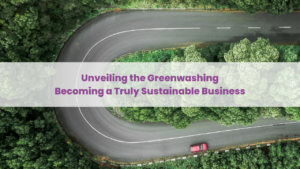Unveiling the Greenwashing: Becoming a Truly Sustainable Business

In today’s world, sustainability has become a buzzword, and many businesses are quick to adopt “green” practices as a marketing tactic rather than a genuine commitment. However, consumers are becoming increasingly aware of greenwashing—the act of misleading customers about a company’s environmental practices. To stand out and make a real difference, businesses must go beyond superficial measures and embrace true sustainability. In this blog post, we will explore the key steps to becoming a truly sustainable business, focusing on long-term strategies rather than short-lived marketing tactics.
Understand the True Meaning of Sustainability:
Before embarking on the journey to sustainability, it is crucial to grasp its essence. Sustainability goes beyond recycling or reducing energy consumption; it encompasses the entire lifecycle of a business, considering social, environmental, and economic aspects. It involves finding the delicate balance between meeting present needs without compromising the ability of future generations to meet their own. True sustainability requires integrating sustainable practices into every aspect of your business.
Set Clear Sustainability Goals:
To be a truly sustainable business, you need to set clear and measurable sustainability goals. These goals should align with global sustainability frameworks, such as the United Nations Sustainable Development Goals (SDGs), and be relevant to your industry. Establishing targets for reducing carbon emissions, increasing energy efficiency, promoting diversity and inclusion, or minimising waste can help guide your sustainability efforts and provide a benchmark for progress.
Embrace Transparency:
Transparency is the foundation of trust and authenticity in sustainability. Share your sustainability journey openly and honestly with your customers, employees, and stakeholders. Be transparent about your progress, challenges, and setbacks. Authentic communication builds credibility and fosters meaningful relationships with your stakeholders, who can then hold you accountable for your sustainability claims. Utilise your website, social media platforms, and annual reports to share your sustainability initiatives and progress regularly.
Integrate Sustainability into Your Operations:
Becoming a truly sustainable business requires integrating sustainability into your core operations. Evaluate your supply chain, identify areas for improvement, and work collaboratively with suppliers to implement sustainable practices. Consider factors such as ethical sourcing, reducing waste, optimising energy consumption, and implementing environmentally friendly packaging solutions. Engage your employees in sustainability initiatives by providing training, creating a culture of environmental consciousness, and encouraging innovative ideas.
Innovate and Rethink Your Products/Services:
Reimagining your products or services with sustainability in mind can be a powerful way to make a genuine impact. Explore ways to reduce the environmental footprint of your offerings, such as using renewable materials, designing for durability and repairability, or developing sustainable alternatives. Innovate and invest in research and development to create sustainable solutions that address the evolving needs of your customers while minimising environmental impact.
Collaborate and Advocate for Change:
Sustainability is a collective effort, and collaboration is key. Seek partnerships with like-minded organisations, nonprofits, and governmental bodies to amplify your impact. Engage in industry associations and initiatives that drive sustainability, allowing you to learn from others and contribute to systemic change. Additionally, advocate for sustainable practices and policies beyond your own organisation. By using your voice and influence, you can encourage wider adoption of sustainable practices in your industry and society.
To make a meaningful impact in a world where sustainability is often used as a marketing ploy, businesses must strive to be genuinely sustainable. This requires a true commitment to integrating sustainability into all aspects of operations and adopting a long-term perspective that goes beyond short-lived marketing strategies.
Lead by example:
Leaders must lead by example by understanding the true essence of sustainability. This involves setting clear goals, embracing transparency, integrating sustainability into operations, re-evaluating products, and services, and fostering collaborations with others. By taking these steps, your business can be at the forefront of genuine sustainability efforts and make a tangible difference for our planet.
Considering that candidates are well-informed about sustainability, how can we ensure that businesses are not seen as the culprits? Candidates are increasingly aware and interested in organisations’ sustainability commitments. By prioritising sustainability, your organisation will not only reap its benefits but also attract high-quality talent.
Ultimately, when you attract people that genuinely value sustainability, it will have a positive impact on your company culture and permeate throughout your business. This will establish a solid foundation for sustainability, going beyond superficial approaches and creating a truly sustainable organisation.
The latest thinking from around Acuity




